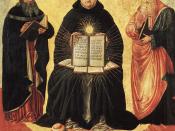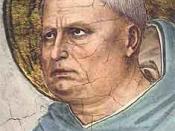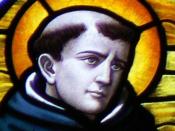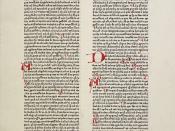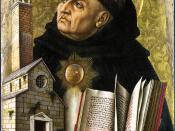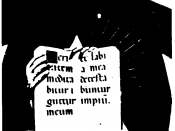Thomas Aquinas lived from 1225 to 1274; this was a critical time for Western Theology. This was a time when faith and reason came together. During this period of time theologians were coming to apply Aristotle's principles of thought to Christian faith. Aquinas did not lead a very eventful life in the eyes of most people, but the man revolutionized Christian Theology. At the age of five, Aquinas began his studies at Montecassino, a Benedictine monastery. Aquinas continued his studies at the University of Naples when the monastery became a battle site. During his studies in Naples, Aquinas was introduced to the Dominican Order. The Dominican Order was a new order that applied the old concepts of Aristotle to modern faith. Over the protests of his family, Aquinas joined the Dominican Order. After joining the order, Aquinas went north to Paris and Cologne to further his studies. Aquinas completed his studies in Paris, and held one of the Dominican seats in the Faculty of Theology for three years.
Next, Aquinas left Paris to join the mobile Papal Court and stayed in Dominican houses all over Italy. After ten years Aquinas was called back to Paris to join in debate against the new Latin Averroism. After another three years in the Faculty of Theology, Aquinas was reassigned to Naples. Aquinas died on March 7th on his way to the Council of Lyon. Aquinas died in the Cistercian abbey at Fossanova, which is less than fifteen miles away from Roccasecca, Aquinas's place of birth.
Thomas Aquinas is perhaps the most recognized and respected theologian of all time. Aquinas supported a belief system that was heavily based in predeterminism. Predeterminism has to do with free will, or the lack of free will in human beings. Aquinas believed in a soft form of predetermined destiny. He believed that God was ultimately responsible for all acts of man and nature. To get a realistic idea of what Aquinas believes we must touch base on a few principles of theology.
Aquinas bases his theology upon the concept of the Cosmological Theory, or First Cause. Aquinas believes that God must exist for anything to exist. Aquinas believes that God is the first, unchanging, and infinite cause for everything. The first principle of existence is "out of nothing, nothing comes." The universe requires a cause for its existence; such a cause must be beyond the limits of the universe as well. Since this being is the first cause it must be considered the greatest of all things, for all things come from it. God by definition is the greatest conceivable being. He is perfectly knowing, perfectly powerful, and totally independent in His existential nature. Aquinas believed that God had a plan for existence and mankind. In the Summa Aquinas states, "The spiritual being of God is further defined as thinking and willing. His knowledge is absolutely perfect since he knows himself and all things as appointed by him. Since every knowing being strives after the thing known as end, will is implied in knowing. Inasmuch as God knows Himself as the perfect good, He will himself as end. But in that everything is will by God, everything is brought by the divine will to Himself in the relation of means to end." (Aquinas, "The Summa: God" pg. 45) The predeterminist aspect of Aquinian belief is that of a secondary will. A person has only the will to affect the way he leads his own life. God's will is ultimately responsible for everything that happens around that person, he chooses how he reacts.
God gives the power of knowing man acts upon that knowledge. A person does not have the power to control every aspect of his or her own existence; he may only choose his own course of action. This is a soft form of Predeterminism. The opposing view to predeterminism would be naturalism. Naturalism is the belief that nothing is predetermined, and there are no power influencing or controlling the universe.
Aquinas achieved an accurate portrayal of his belief system in his definition of God. God is seen as the infinite first cause, and being infinite he would also have to be the infinite end.
Ethics was also a major part of Aquinian Theology. In Aquinas's book, "The Summa Part II: Ethics" he goes into the idea of sin and evil. According to Aquinas, "an act becomes evil through deviation from the reason and the divine moral law." To sin would mean making an act that goes against the nature of God. Aquinas also believed that humans were born into sin, the Original Sin. Man's state in paradise, before The Fall was a harmony of all of man's powers before they were blighted, and the continuous indwelling power of good. The act of procreation is considered sinful but necessary. Sex is considered sinful because it involves lust, and occasionally greed. This hereditary evil is mankind's punishment for Adam's Original Sin. When the first man transgressed the order of nature and grace, he and the human race as a whole lost the harmonious continuance of God's will. This Original Sin, was in a way responsible for mankind's "state of grace". Man's freewill and natural disposition leaning toward the nature of God lends him a certain amount of grace, because he is responsible for those acts of goodness he achieves. Being capable of sin, and choosing divine nature instead is better than to have no choice but to pursue actions toward the Divine End. Human acts are meritorious only if they promote God's Will.
Aquinas addresses the problem of evil with the idea of God allowing people to fall short of eternal life. It is the "will of permitting anyone to fall into sin and incur the penalty of condemnation for sin." (Aquinas, "The Summa" pg. 79) In every act of God, His justice presupposes his mercy. Aquinas states, "he owes no one anything and gives more bountifully than is due." (Aquinas, "The Summa" pg. 81) Aquinas also believes the soul is the indivisible form of man, an immaterial substance. The soul's power of knowing has two sides, the active and the passive. Here Aquinas basically separates a person's intellect into two halves: the unchanging soul and the working intellect. The unchanging soul is imbued with a sense of God's nature, while the working intellect processes the information received.
Aquinas fiercely advocates freedom of will, but his beliefs lie primarily in a determinist approach. Throughout his life, Aquinas blessed western culture with many advances and new conceptions regarding faith and existence.
Works Cited: Aquinas, Thomas. "The Summa Theologies" (pages 1-85) Aquinas, Thomas. "Summa Contra Gentiles" http://plato.stanford.edu/entries/aquinas/ (Stanford Encyclopedia of Philosophy) http://www.aquinasonline.com (The Thomistic Philosophy Page) "A Companion to the Summa" by Walter Farrel McInerny, Ralph. "A First Glance at Thomas Aquinas: Handbook for Peeping Thomists" Maritain, Jacques. "St. Thomas Aquinas" Bourke, Vernon J. "Aquinas Search for Wisdom" McDermott, Timothy. "Aquinas Selected Writings" Pieper, Josef. "Guide to Thomas Aquinas"
